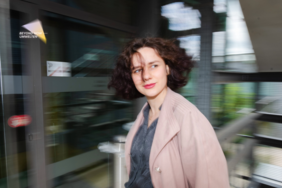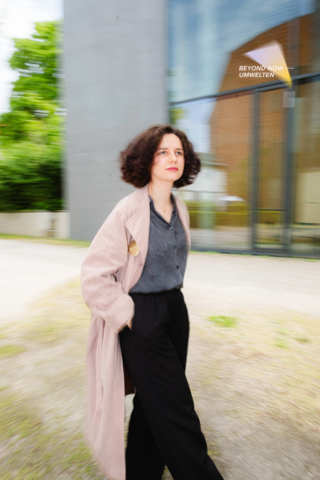BEYOND NOW – Design Meets Science: What Happens When the Spark Ignites?
Masihne Rasuli, artistic staff member in Visuelle Kommunikation (Visual Communication), has long been interested in scientific topics. To get her students interested in the world of research, she will be offering a new course in the upcoming 2025/2026 winter semester: »Science, Bitch!«. In this course, design and science meet on an even playing field. It is not about explaining from an outside perspective, but rather about understanding and communicating from the inside.
»Making complex topics understandable is a real privilege for me«, says Masihne Rasuli. »I want to encourage students to leave their comfort zone, take on new perspectives, and allow their curiosity to be unleashed. Scientific and technical topics can be complex and challenging, and that's exactly what makes them exciting.«
The course will focus on the topic of » Resources«: Climate change, energy cycles, materials for the future. Students won’t be looking at these subjects from afar, but rather right from the centre of things. Excursions to the Fraunhofer Institute for Microstructure of Materials and Systems (IMWS) in Halle and a steel factory in Salzgitter are planned. Both are locations where research, testing, and production are carried out. During the excursions, students will learn about processes that are often carried out behind the scenes and, in the best-case scenario, the spark will be ignited.
»It grapples with the question of how to deal with the resources that we have. And how we can do this more sustainably«, say Rasuli. »But these are deep-diving questions and involve technical processes and scientific principles, concepts that are difficult to grasp. This is exactly where our project comes in and attempts to make the complicated accessible, and in a unique way.« The exact projects the students are working on and how they are implementing them remains open for the time being. »My experience is that quality work is created when people are given the space to find their own individual approaches. When the interest comes from within, it’s exciting and the results are all the more convincing.«
Over the course of the semester, students will develop unique formats between information design and spatial installation, between data and dramaturgy. There are numerous possibilities: interactive exhibits, narrative visualisations, participatory communication. Inspiration also comes from external sources. The programme also includes a visit to the Dresden Hygiene Museum - an institution that has been demonstrating for years how clearly and tangibly science communication can work.
The course will conclude with an exhibition: »Science, Bitch! Schlüssel zu einer nachhaltigeren Welt« (the key to a more sustainable world). The exhibition will present projects and act as a call for a design theory that arouses curiosity, is open to new subjects, and sees design as a connecting tool between disciplines.
The project is funded by the Bauhaus-Universität Weimar as part of the »Beyond Now –Environment« annual theme.
Text: Romy Weinhold
Photos: Julian Linden
Social Media: Marit Haferkamp
Signet: Romi Klockau
Concept and Editorial: Claudia Weinreich


